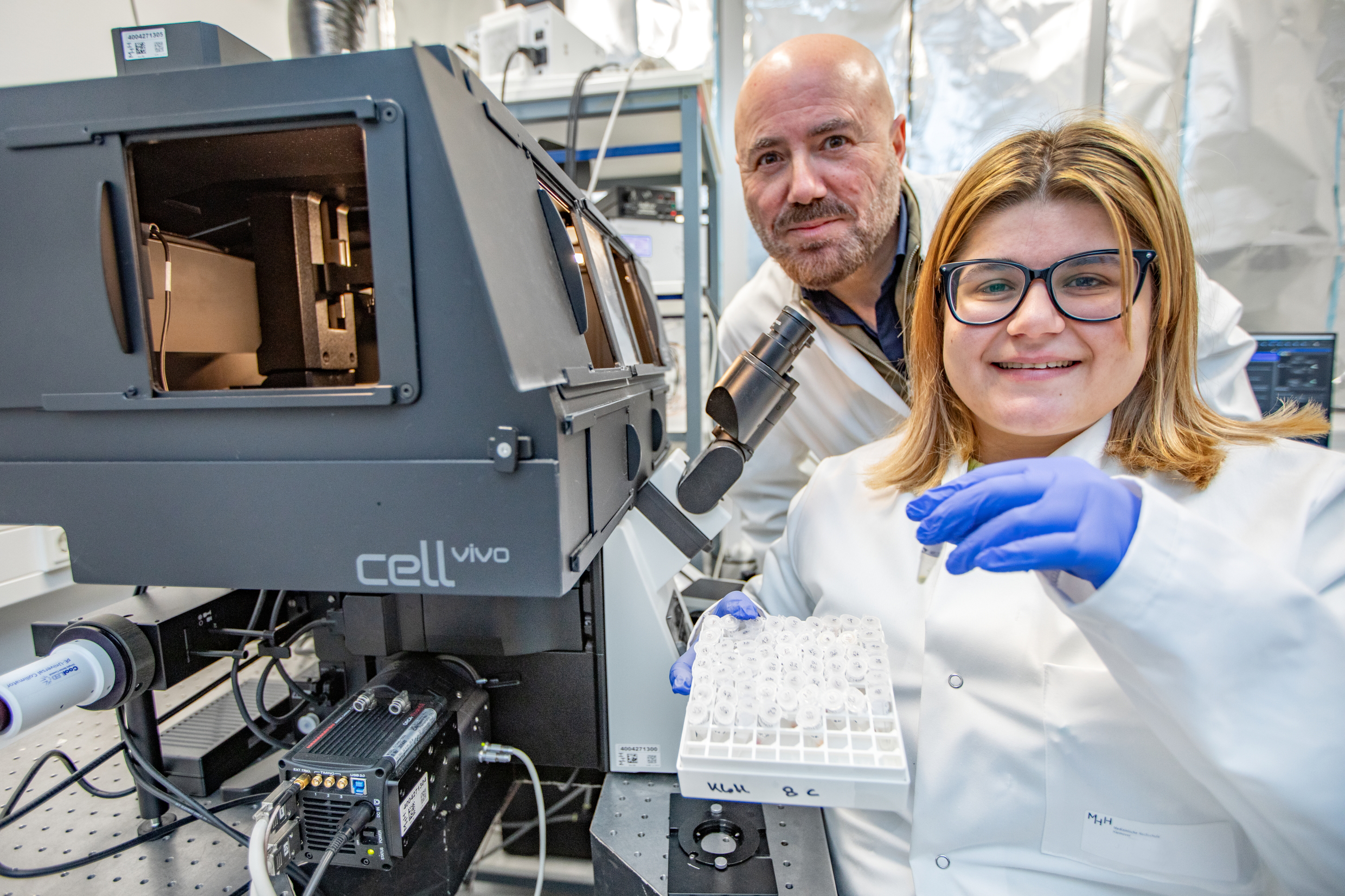MHH research team disables tumour cells with synthetic Adhibin and prevents migration and attachment to other cells.

They have discovered a substance that prevents tumour cells from forming metastases: Professor Dr. Georgios Tsiavaliaris and doctoral student Despoina Kyriazi. Copyright: Karin Kaiser / MHH
Every cell in the body normally has its fixed place as part of a tissue structure. Except for a few cell types, such as blood or immune cells. But cancer cells also cross established boundaries, grow into the surrounding tissue and multiply. And they can detach from the cell structure and spread via the blood or lymphatic vessels to other areas of the body, where they attach to new cells and form metastases. The changes that cancer cells undergo to metastasise are not yet fully understood. Rho (Ras-homologous) GTPases apparently play an important role. These proteins process signals within cells and regulate, among other things, growth, differentiation into the genetically predetermined cell type and cell migration.
Rho GTPases are molecular switches that switch between an active and an inactive state by binding to the phosphate compounds GTP and GDP. GTP corresponds to the ‘on’ position of the switch and starts the molecular biological processes, while GDP corresponds to the ‘off’ position and stops them. A balancing act for the cell: if these Rho proteins are too numerous or too active due to genetic changes, they can cause serious damage to cellular growth and differentiation processes and trigger cancer, for example. A research team led by Professor Dr. Georgios Tsiavaliaris, head of the Cellular Biophysics research group at the Institute of Biophysical Chemistry at the Hannover Medical School (MHH), has now found a substance that intervenes in a specific step of the complex Rho signalling pathways and not only prevents tumour cells from forming solid cell clusters but also from actively migrating. This intervention can be used to prevent the formation of metastases. The results of the research have been published in the renowned journal Nature Communications.
Motor function neutralized
In his working group, Professor Tsiavaliaris is conducting research into myosin motors. These motor proteins are mini-machines that drive many vital processes in our cells, including force and movement. They transport small ‘packages’ within the cell and interact with the cytoskeleton, a dynamic scaffold of filaments and tubes that extends from the cell nucleus to the cell membrane. In addition, myosins reduce the activity of Rho GTPases and are therefore particularly interesting as anti-metastatic targets. ‘My research team has discovered a synthetic agent called Adhibin that inhibits the motor function of myosins and thus inhibits the Rho proteins even more,’ says the biochemist. This suppresses the Rho-GTPase-mediated mechanisms of metastasis. As a result, tumour cells can no longer migrate undisturbed and cannot attach themselves to other sites.
Tumour cell is paralysed
Unlike many cancer drugs that also kill healthy cells, Adhibin only interferes with metastasis, so to speak, it paralyses the cancer cell. ‘This is important because although Adhibin could also affect the Rho GTPases in other cells, it is not toxic and the harmful effect on healthy cells remains limited,’ explains Professor Tsiavaliaris. The biochemist, together with Despoina Kyriazi, a research associate in his group and the first author of the paper, has already successfully tested the agent in tumour cells and in mini-organ models: ‘We were able to virtually freeze cell migration when we added Adhibin.’ When Adhibin was removed, the tumour cells were able to migrate again and attach themselves to other cells.
The team has already created a small library of different Adhibin variants. These will now be tested in further preclinical studies if possible. If their efficacy is proven and no unexpected side effects emerge, they could provide a new basis for the development of antimetastatic drugs and supplement existing cancer therapies.
The original paper „An allosteric inhibitor of RhoGAP class-IX myosins suppresses the metastatic features of cancer cells” can be found here.
Text: Kirsten Pötzke